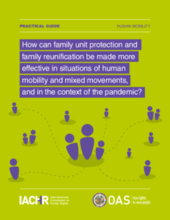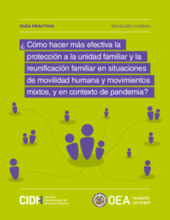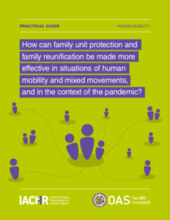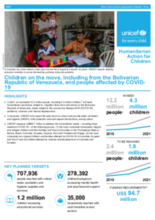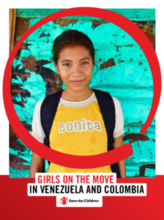Displaying 1 - 10 of 17
The guide recommends a series of measures aimed at States, which focus on protecting family unity, preventing separation, and ensuring reunification in the context of human mobility, including for unaccompanied or separated children and adolescents, who require international protection or who leave their homes in search of better opportunities or family reunification.
la Comisión Interamericana presenta la guía ¿Cómo hacer más
efectiva la protección a la unidad familiar y reunificar a la familia en los procedimientos migratorios y de protección en contexto de pandemia? en la que
se analizan los estándares interamericanos aplicables a la luz de las obligaciones
internacionales de los Estados y propone recomendaciones para garantizar la unidad
familiar y la reunificación familiar así como prevenir los riesgos de separación y minimizar los impactos en los casos de separación familiar. Asimismo, la implementación
de las garantías de la reunificación familiar requiere muchas veces de una estrategia idónea de acceso a mecanismos de regularización documental, así como de condiciones seguras de viaje y movilidad a través de las fronteras nacionales. Esto es especialmente benéfico para familias que se han visto separadas de manera forzada o por
razones asociadas a la movilidad humana.
he Inter-American Commission on Human Rights (IACHR) has issued, in collaboration with the UN Refugee Agency (UNHCR), a practical guide on how to protect family unity and reunification more effectively in human mobility and mixed movement contexts during the ongoing COVID-19 pandemic. This publication is part of a series of guides issued by the IACHR to address the impact of the pandemic on human rights. The guide makes recommendations to States, so they may protect family unity, prevent separation, and take any necessary measures to ensure the reunification of families who may have been separated in contexts associated with human mobility.
This edition of Humanitarian Action for Children – UNICEF’s annual humanitarian fundraising appeal – describes the ongoing crises affecting children on the move, including from the Bolivarian Republic of Venezuela, and people affected by COVID-19; the strategies that UNICEF is using to respond to these situations; and the donor support that is essential in this response.
This report examines the two-sided dilemma for Venezuelan children during the COVID-19 pandemic: 1) the dire economic situation they faced prior to the declaration of the Coronavirus pandemic and 2) the exacerbating factors that have deepened their vulnerability since the pandemic began.
"Venezuela’s mothers and fathers, determined to find work, food and medicine, are leaving hundreds of thousands of children in the care of grandparents, aunts, uncles and even siblings who have barely passed puberty themselves," says this article from the New York Times.
This article from the Guardian shines a light on the "nearly one million 'left-behind' Venezuelan children whose parents have been forced to migrate, leaving their offspring in the care of grandparents, aunts, siblings, neighbours or sometimes even completely alone."
This report consolidates findings from a rapid participatory consultation with: (1) migrant girls in the Northeastern Colombia border region, (2) front-line practitioners providing services to migrant children and their families, and (3) Save the Children teams in Colombia.
El presente estudio aborda la realidad del impacto de la migración forzosa en niños, niñas y adolescentes venezolanos.
This article from the Washington Post describes the threats to families in Venezuela today, including the instances of family separation due to poverty and lack of resources.

